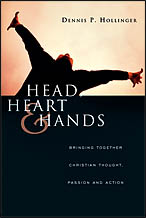
Along with significant ways in which our mind has been part of coming to Christ, growing in faith, and engaging the world, Distortions of the Head* also come quickly to our thoughts when considering loving God with our mind.
- What Distortions of the Head have been particularly difficult for you and the communities in which you are involved?
- How have you (and the communities in which you are involved) sought to address these issues in relationship to loving God?
Below is some material on the topic in outline form, feel free to interact with it and/or share some of your own thoughts.
Distortions
- Neglect: too little attention to the mind
- Symptoms of neglect
- Feelings-driven faith
- Spiritual experiences are guided from within, i.e., outside or external influences are ignored
- Disparaging the mind leads away from orthodoxy and towards heresy
- Inability to engage the world as salt and light
- Acquiescence, i.e., borrowing the thinking of the world
- Attempts to control the world
- Brief response: The admonition of Matthew 22:7 is to love God with all our mind. To fail to do so, will mean our faith comes up short.
- Symptoms of neglect
- Overemphasis: too much reliance on the mind
- Symptoms of superiority of the mind:
- Cold-hearted faith which fails to grasp the need for heart and hands
- Denigration of heart and hands
- Intellectual snobbery and pride, i.e., a “puffed up” perspective
- Hiding from the truth through firm beliefs
- Symptoms of superiority of the mind:
Principles for a Healthy Head: Avoiding the Distortions of the Head
- Studying scripture and biblical literacy
- Personal and corporate
- Exegesis and applications for life
- Integrating faith and learning
- Study of scripture is not just for theologians.
- Developing a Christian worldview
- Integrating faith and one’s work
- Being a scholar who is a Christian vs. being a Christian scholar
- Using the mind for God’s glory, i.e., good thought-work honors God and it is what God wants for us
Examples from Jesus and Paul
Meet those who you talk to with your mind ’ and a heart for their lives
- The woman at the well (John 4:4-26)
- The adulteress who was to be stoned (John 8:1-11)
- The rich young ruler (Mark 10: 17-22)
- Respect for brothers and sisters in Jesus
- “Now about food sacrificed to idols: We know that we all possess knowledge. Knowledge puffs up, but love builds up” – I Corinthians 8:1.
- What other texts “come to mind” as illustrations of meeting those who you talk to with your mind ’ and a heart for their lives. Do you have a story from your own life to share (on the giving and/or receiving end)?
Questions
In case you haven’t already done such, please let us know what “comes to mind” as
- Distortions of the Head which have been particularly difficult for you and the communities in which you are involved.
- You (and the communities in which you are involved) have sought to address these issues in relationship to loving God.
Next in series: Christian Faith and the Heart.
*Drawn from an adult elective based upon Dennis Hollinger‘s “Head, Heart & Hands: Bringing Together Christian Thought, Passion and Action” (InterVarsity Press, 2005). Kevin Milligan facilitated the class at Elizabethtown Brethren in Christ Church. Note: See the first post in the series for more on the genesis of this study guide as part of a local Emerging Scholars Network partnership (South Central Scholars Network PA FB and Christian Scholar Series).

Tom enjoys daily conversations regarding living out the Biblical Story with his wife Theresa and their four girls, around the block, at Elizabethtown Brethren in Christ Church (where he teaches adult electives and co-leads a small group), among healthcare professionals as the Northeast Regional Director for the Christian Medical & Dental Associations (CMDA), and in higher ed as a volunteer with the Emerging Scholars Network (ESN). For a number of years, the Christian Medical Society / CMDA at Penn State College of Medicine was the hub of his ministry with CMDA. Note: Tom served with InterVarsity Christian Fellowship / USA for 20+ years, including 6+ years as the Associate Director of ESN. He has written for the ESN blog from its launch in August 2008. He has studied Biology (B.S.), Higher Education (M.A.), Spiritual Direction (Certificate), Spiritual Formation (M.A.R.), Ministry to Emerging Generations (D.Min.). To God be the glory!

Francis Schaeffer often talked of the conflict between faith and reason, using language about an “upper story and lower story” he blamed certain theologians for separating the two, with religious “knowledge” being experiential, non-cognitive in the upper story, and science and reason and logic in the lower story and never the twain shall meet this is comfortable for academics… no one can attack their religious faith because it doesn’t operate in the area of rigorous inquiry reminds me of Pascal in one of his Pensees: “the heart has resaons the mind knows not of” … A CMU professor once spoke on “some things I know, some things I believe”… this sounds like the upper and lower story mentality, that places faith and belief beyond knowledge.
But there is a dry, empty type of knowledge in academia that has little relation to anything practical, that does not connect with our deeper needs the Harvard faculty in recent years rebuilt the general curriculum they were told to include some core courses that would have practical value after graduation they struggled with this, and found it almost impossible a Christian student at Harvard said his classes had no personal meaning for him, except when he violently disagreed with the viewpoint of a professor. And local intervarsity students said they didn’t want a guest speaker to lecture them at their large group Friday night meetings: “we have enough of that during the week in classes, we just want to relax and have fun”.
Paul (Corinthians?) says that “knowledge puffs up, but only through love can we grow to full maturity” … Is he against knowledge? Knowledge, in the Bible, is meant to direct us to greater love and obedience for God. Love the Lord with all your heart and mind.
One student was overheard at a booktable at a Christian conference: “I’ve already read all these books”, he proudly said. His knowledge puffs up. I should have said, “why don’t you now put some of this into practice”. Nothing makes an old truth shine like putting it into practice. “If you know these things, blessed are you if you do them”, the Bible says.
Is Christian faith something caught, and not taught. I don’t see how we can do helpful apologetics with students if our minds are not trained Francis Schaeffer wanted to give “honest answers to honest questions”… But spoken with humility, and sensitivity to where the questioner. DA Carson was asked one of the hardest questions he was ever asked. “Isn’t it arrogant and self-serving of God to demand our worship”… he struggled with this a long time… it’s for our sake that God wants us to worship Him… He made us for Himself, and our happiness depends upon that… teachers need a certain respect and authority from students, hopefully not to protect their egos, but for the sake of a learning environment in which the students can benefit best… it’s for the sake of the students… Could Carson have answered this question if he thought religious faith was nothing but experience beyond reason and discussion?
I find heart and mind working together during my morning time of praying through the Psalms taking time to meditate on a few verses, listening to the Holy Spirit speak to heart and mind and soul a blessed time of communion and conversation with the Lord.
Thank-you Miller. It’s so good to be reminded of Schaeffer’s reflections upon “upper story and lower story” AND to read testimony of God’s visit with you each morning through the Psalms. May the Lord continue to richly bless your day, each and every day through the Word, the Spirit, and His communion/conversation with you. May we, the other readers of the ESN blog, be able to likewise give such testimony. To God be the glory!